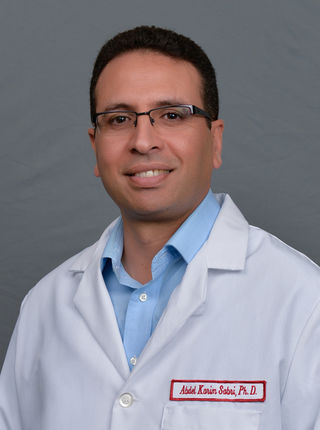Abdel Karim Sabri, PhD
Professor, Aging + Cardiovascular Discovery Center (ACDC)
Professor, Cardiovascular Sciences
Professor, Alzheimer's Center at Temple
Professor, Center for Metabolic Disease Research
Professor, Sol Sherry Thrombosis Research Center
Professor, Biomedical Education and Data Science

- Contact Information
-
- About Me
-
Research Interests
Our lab studies the molecular and cellular basis of heart failure, with a particular emphasis on the role of inflammatory mediators and innate immunity in disease progression in the failing heart. Our team examines how inflammatory mediators and innate immunity leads to pathological cardiomyocyte growth or programmed cell death and contributes to diseases such as cardiac hypertrophy, cardiomyopathy, and heart failure. We address these questions in cultured cells using gain- and loss-of-function of molecules of interest. We then translate these findings in vivo by generating transgenic mice that either selectively overexpress or delete the candidate molecules in the mouse heart, which is followed by an in-depth analysis of the physiological phenotype. Our long term goals are to provide novel insights about the molecular pathways that govern cardiac myocyte growth and function and to use this information to devise pharmacologic and genetic therapies for heart diseases in humans.
Area of Research:
1. Inflammatory serine proteases and cardiac repair.
One prime focus in the lab is to investigate the role of inflammatory serine proteases (ISPs) on cardiac disease. These proteases are released by inflammatory cells after myocardial injury and their role in cardiac cells growth is not well understood. Work in the lab has established the interaction of ISPs with receptor tyrosine kinases and integrins/focal adhesion kinases to regulate focal adhesion signaling, cell attachment and cell survival. We are currently developing new approaches to target ISPs specifically to the injured myocardium using nanocarriers. Our long term goals are to reduce adverse cardiac remodeling and enhance cardiac regeneration and repair after myocardial injury.
2. Protease activated receptors in heart disease
The physiological functions of serine proteases extend beyond blood coagulation and play a pivotal role in influencing inflammatory and repair responses to tissue injury in part via protease-activated receptors (PARs). Early studies from our group identified for the first time the expression of protease activated receptors type-2 and -4 in cardiac myocyte and characterized their role in promoting distinct signaling pathways that lead to myocyte hypertrophy. Our group is investigating the effect of PAR1 and PAR4 inhibition on cardioprotection induced in response to myocardial ischemia and is defining the molecular mechanisms involved.
3. G protein coupled receptors and receptor tyrosine kinase crosstalk in adaptive and maladaptive cardiac hypertrophy.
Activation of G protein coupled receptors (GPCRs) results in the cellular release of agonists that stimulate growth factor receptor tyrosine kinase (RTK) signal pathways. This transactivation mechanism expands the range of the cellular functions attributable to GPCR-mediated signaling networks. Over the past decade our work has mainly been focused on the ability of the GPCR to transactivate the epidermal growth factor receptor that was involved in cardiac fibroblast proliferation and cardiomyocyte hypertrophy. Our group has recently characterized the function of a E3 ubiquitin ligase that targets key RTK signaling leading to their downregulation in cardiac disease. We are pursuing these studies and we are investigating the relevance of GPCR and RTK turnover in the regulation of cardiac physiological and pathological functions.
- Education, Training & Credentials
-
Educational Background
- PhD, Cell Biology, Rene Descartes University, Paris, France
- BS, Cell Biology, Rennes I University, Rennes, France
- Publications
-
Digital Bibliography
